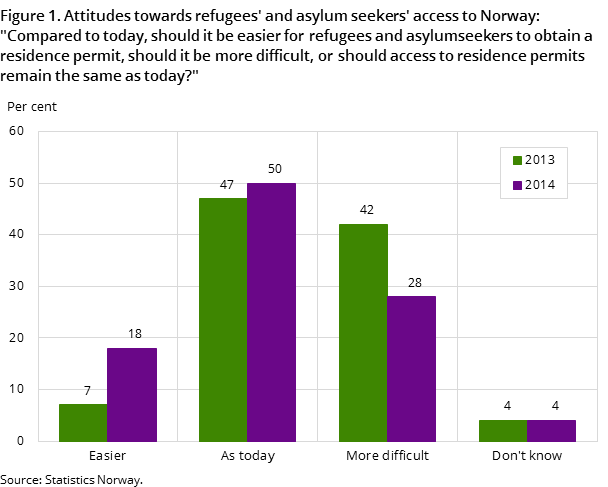Content
Published:
This is an archived release.
Greater willingness to receive refugees
More people than before think it should be easier for refugees and asylum seekers to obtain a residence permit in Norway. While only 7 per cent expressed that opinion in 2012 and 2013, the share supporting this view in 2014 has increased to 18 per cent.
| 2005 | 2013 | 2014 | |
|---|---|---|---|
| Most immigrants make an important contribution to Norwegian working life | |||
| Strongly agree | 24 | 29 | 32 |
| Agree on the whole | 45 | 43 | 45 |
| Disagree on the whole | 13 | 10 | 9 |
| Strongly disagree | 5 | 4 | 3 |
| Most immigrants enrich the cultural life in Norway | |||
| Strongly agree | 36 | 32 | 36 |
| Agree on the whole | 35 | 37 | 33 |
| Disagree on the whole | 11 | 13 | 13 |
| Strongly disagree | 8 | 4 | 5 |
| Most immigrants are a cause of insecurity in society | |||
| Strongly agree | 13 | 11 | 9 |
| Agree on the whole | 27 | 24 | 19 |
| Disagree on the whole | 26 | 30 | 31 |
| Strongly disagree | 23 | 22 | 29 |
| Attitudes towards refugees' and asylum seekers' access to residence permits in Norway. Compared to today, should it be easier, more difficult or remain the same as today? | |||
| Easier | 9 | 7 | 18 |
| As today | 49 | 47 | 50 |
| More difficult | 39 | 42 | 28 |

This is one of the findings in the annual population survey of attitudes towards immigrants and immigration conducted by Statistics Norway between 1 July and 10 August this year.
While more people think it should be easier for refugees and asylum seekers to get a residence permit, the share who think it should be more difficult to obtain a residence permit decreased from 42 to 28 per cent. Half the population think that access to permanent residence should be “the same as today”.
Fewer see immigrants as a source of insecurity in society
In 2014, 28 per cent agreed strongly or on the whole that 'Most immigrants represent a source of insecurity in society'; a decline of 7 percentage points since last year. Sixty per cent disagree with the statement, while 10 per cent answered “either/or”. Despite some of the field work being carried out in the days following the official terror warning issued in the summer, the answers do not appear to be affected. In the early 2000s there was a majority who agreed with the statement.
Greater acceptance of immigrants in the labour market
Several questions relating to attitudes also signal an increased acceptance of immigrants in the labour market. This is a domain where attitudes tend to vary somewhat from year to year. In 2014, 77 per cent agree that 'Most immigrants make an important contribution to Norwegian working life'. This is an increase of 5 percentage points from last year. In 2012, 80 per cent supported the statement.
The share agreeing that 'Labour immigration from non-Nordic countries makes a mainly positive contribution to the Norwegian economy' has also increased. This year, 70 per cent agree strongly or on the whole with this statement. Fifteen per cent disagree and 12 per cent answered “either/or”. As last year, 86 per cent agree that 'All immigrants in Norway should have the same job opportunities as Norwegians'. Here, the share agreeing strongly with this statement has increased at the expense of the share agreeing on the whole, while the share disagreeing strongly has decreased.
Varying attitudes according to background factors
Women are usually somewhat more liberal or positive towards immigrants and immigration than men. The most elderly are more sceptical, whereas the 25-44 year olds are the most immigrant-friendly according to age. The highly educated and persons who have contact with immigrants themselves are also more immigrant-friendly. People resident in rural areas are more sceptical than people resident in the most urban areas. Persons who have an immigrant background themselves, especially from Europe and North America, also tend to be more positive. This group only makes up 5 per cent of the sample.
Purpose of the surveyOpen and readClose
Statistic Norway’s annual survey on attitudes towards immigrants and immigration is conducted on behalf of the Ministry of Justice and Public Security. The aim is to reflect the sentiment of the population with regard to various aspects of the country’s immigration and refugee policy and towards immigrants as a group.
Contact
-
Frøydis Strøm
E-mail: froydis.strom@ssb.no
tel.: (+47) 40 81 13 17
-
Christian Sørlien Molstad
E-mail: christian.molstad@ssb.no
tel.: (+47) 46 65 99 12
